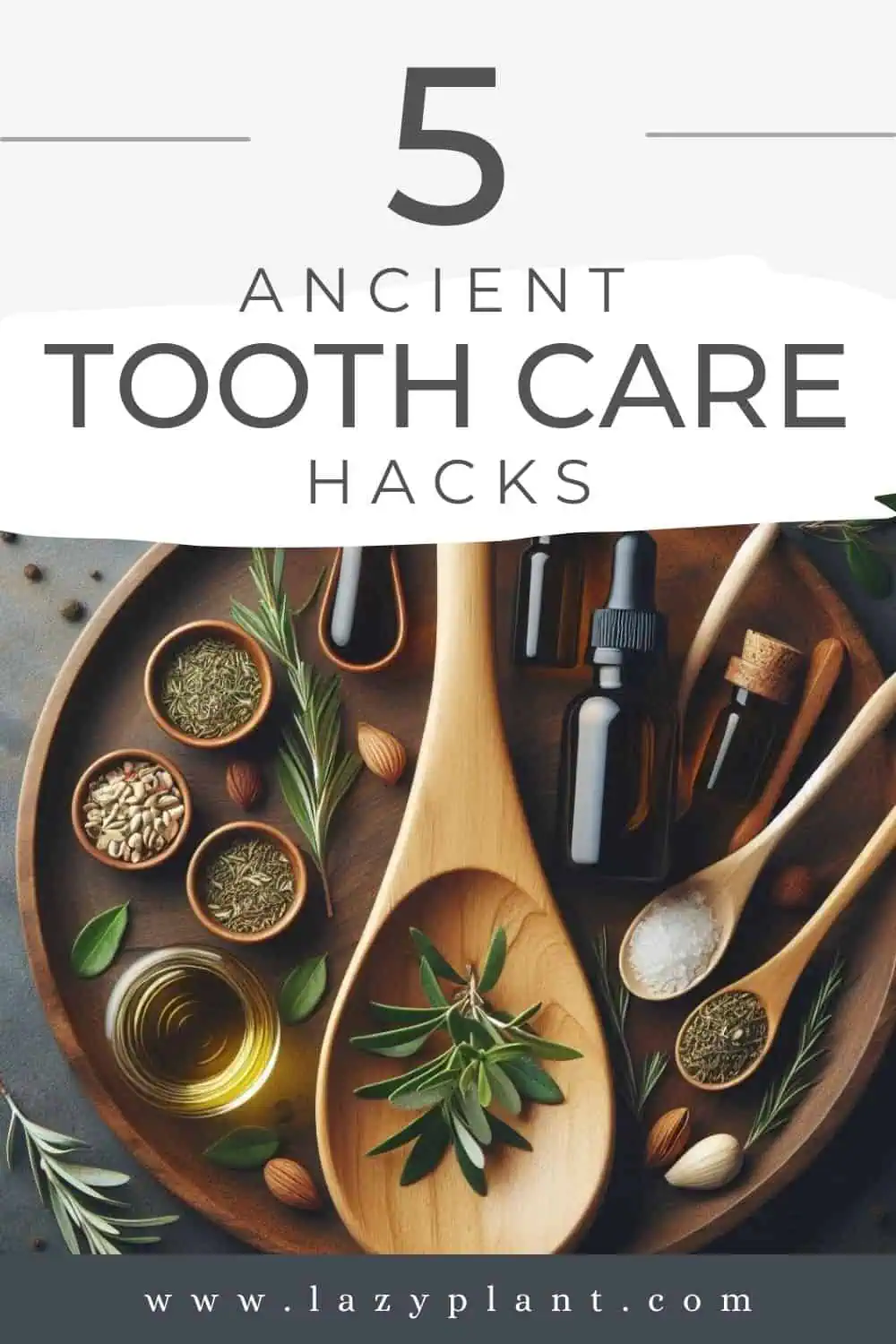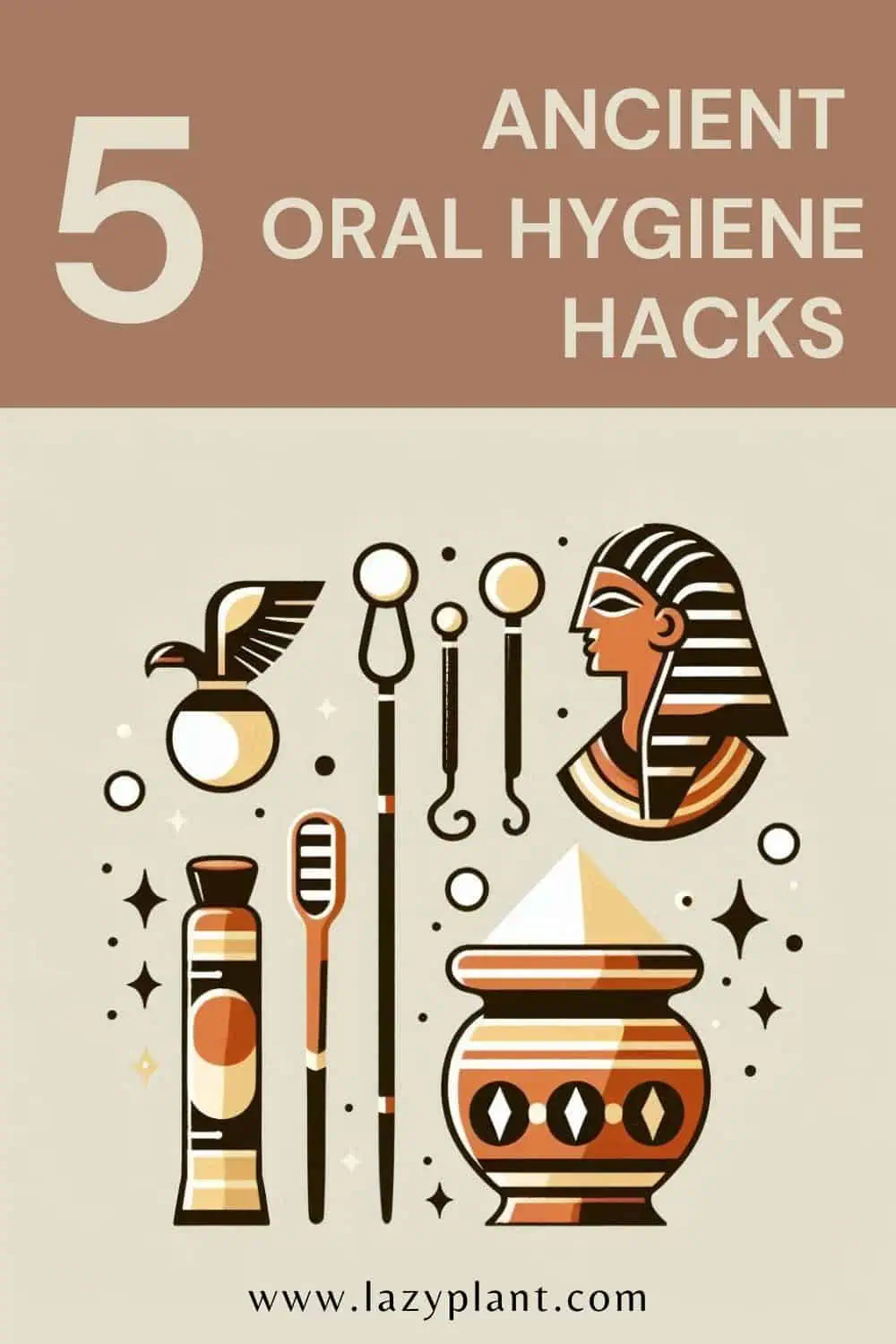By combining the natural, nutrient-rich foods of the Mediterranean diet with time-tested oral hygiene practices, you can take a holistic approach to maintaining healthy teeth and gums. Incorporating more plant-based foods, healthy fats, and traditional care methods like chewing sticks and oil pulling can complement your modern oral hygiene routine, ensuring long-term dental health and a beautiful smile.
The Mediterranean way offers not only a nutritionally balanced diet but also ancient wisdom that can help you care for your teeth, naturally and effectively.
Tooth Cleaning in Ancient Mediterranean Times
Oral hygiene was important across the Mediterranean even in ancient times, with a focus on using natural and available resources to maintain dental health. These traditional methods, though not as effective as modern techniques, were foundational for the development of modern oral care.
The Egyptians were advanced in dental care. They used tooth powders made from ox hooves, eggshells, and ashes. Some wealthy Egyptians even had rudimentary dental work performed. Also, both Ancient Greeks and Romans placed a strong emphasis on personal grooming, including oral hygiene. Roman aristocrats, for instance, used powders made of charcoal, crushed bones, and herbs to clean their teeth.

Chewing Sticks and Plant Fibers
People in Ancient Egypt, Greece, and Rome used chewing sticks, often made from branches of aromatic trees like olive or miswak. Chewing on these sticks helped remove food particles and plaque, while the natural fibers acted like bristles to scrub the teeth.[1]
Widely used across the Mediterranean and North Africa, miswak (a chewing stick from the Salvadora persica tree) has been used for oral hygiene for over 7,000 years. Miswak contains natural antimicrobial properties and fluoride, which help maintain oral health and prevent cavities.
Powdered Tooth Cleaners
Ancient Egyptians created tooth powders using a mixture of ingredients like ground pumice, ashes from burnt eggshells, and ox hooves, mixed with water to form a paste. This early form of toothpaste was abrasive and helped remove debris and whiten teeth.
The Greeks and Romans also used crushed bones, oyster shells, and charcoal as tooth-cleaning powders.
Rinsing with Vinegar and Herbal Mouthwashes
In ancient Rome, people used mouthwashes made from vinegar, salt, and sometimes honey or herbs to clean their mouths and freshen breath. These solutions had mild antibacterial properties.
In ancient Greece and Rome, people used herbs like rosemary, thyme, and sage for oral care. These herbs have antimicrobial properties and were chewed or used in mouth rinses to prevent infections and keep breath fresh.
Toothpicks
Archaeological findings have shown that toothpicks were commonly used in ancient Mediterranean cultures. Simple tools, often made of wood, bone, or metal, were used to remove food particles from between teeth.
Natural Abrasives and Antiseptics
The Romans were known to use natural abrasives such as crushed seashells or powdered marble to scrub their teeth. They also used antiseptics like myrrh and baking soda for cleaning and freshening their mouths.
Though its origins are more commonly tied to ancient India, oil pulling with olive oil was also a traditional practice in Mediterranean cultures. Swishing a tablespoon of olive oil for 15–20 minutes helps remove bacteria from the mouth and can reduce bad breath, prevent gum disease, and promote overall oral hygiene.
Modern Mouth Hygiene and the Mediterranean Diet
Today, science confirms the importance of good oral hygiene, and the Mediterranean diet—rich in vegetables, fruits, nuts, and healthy fats—can play a critical role in maintaining dental health.
The Role of the Mediterranean Diet in Oral Health
The Mediterranean diet is renowned for promoting overall health, particularly heart health and longevity, but it also provides significant benefits for your teeth and gums.
The diet emphasizes antioxidant-rich foods such as fruits, vegetables, and olive oil. These foods reduce inflammation in the body, which is essential for preventing gum disease. Vegetables like leafy greens, tomatoes, and citrus fruits provide essential vitamins—such as vitamin C—that help strengthen gum tissue and support healing.
Dairy products like yogurt and cheese are calcium-rich, which strengthens teeth and bones. Nuts, particularly almonds and walnuts, also contain calcium and phosphorus, helping remineralize enamel and prevent tooth decay.
The diet’s inclusion of fatty fish like sardines and anchovies provides omega-3 fatty acids, which have anti-inflammatory properties. Omega-3s reduce the risk of periodontal disease, keeping gums healthy.
Extra virgin olive oil, a cornerstone of the Mediterranean diet, contains polyphenols that help fight bacteria in the mouth and reduce plaque buildup. Studies suggest that consuming olive oil can decrease the risk of cavities and gum disease.[2]
Modern Oral Hygiene meets Ancient Wisdom
While modern oral hygiene practices like brushing twice daily with fluoride toothpaste and flossing are critical, incorporating traditional Mediterranean hacks can enhance dental health. Here are a few tips on how to combine modern methods with ancient wisdom:
You don’t need to replace your toothbrush, but using a miswak stick occasionally can help freshen breath and remove plaque naturally.
Consider using a baking soda-based natural powder once a week to brighten teeth and gently polish away surface stains.
Integrate oil pulling into your routine by using extra virgin olive oil once a week. Swish for about 15 minutes and rinse with warm water.
Make a simple mouthwash at home using salt, vinegar, and a few drops of essential oils like peppermint or tea tree oil. This provides a natural and effective way to freshen breath and reduce harmful bacteria.
Mediterranean Diet Foods that Support Oral Health
To maximize the benefits of the Mediterranean diet for oral hygiene, incorporate these key foods into your daily meals:
- Leafy Greens (like spinach and kale) for vitamin C and folic acid to promote gum health.
- Fish (like sardines and salmon) for omega-3 fatty acids, which reduce gum inflammation.
- Nuts and seeds (especially almonds and sesame seeds) for calcium and phosphorus, are essential for strong teeth.
- Yogurt, cheese, and especially kefir for probiotics, which balance oral bacteria, and for calcium to maintain strong enamel.
Should I use Mouthwash?
According to the American Dental Association, therapeutic mouthwashes help reduce plaque, gingivitis, bad breath, and tooth decay.[3]
It’s estimated that 60% of the US population uses mouthwash one or more times weekly. About 30% use it daily.
Mouthwashes can improve oral hygiene. They reach areas not easily accessed by a toothbrush or even floss.
Don’t use mouthwash straight after brushing your teeth. Mouthwash will wash away toothpaste’s fluoride left on your teeth.[4]
There are two types of mouthwash. Cosmetic and therapeutic.
- cosmetic mouthwash mainly controls bad breath. But, it doesn’t kill bacteria. Thus, it only has a temporary effect.
- therapeutic mouthwash has compounds that kill bacteria that cause bad breath, gingivitis, plaque, and tooth decay.
Did you know that you can naturally boost your fluoride intake through diet?
Side effects of using mouthwash daily
But, mouthwash kills good bacteria as well. You better consult your dentist before using it daily.
Alcohol in Mouthwash may increase the risk of certain Cancers
First, you may avoid mouthwashes with alcohol. Although further research is needed, mouthwash seems to be another risk factor for the development of head, neck, or oral cancer. Most noteworthy, the risk of developing cancer increases when we combine carcinogenic risk factors, such as alcohol-based mouthwashes, with smoking.[5,6]
Smoking with alcohol consumption increases the risk of these cancers by up to 30 times. So, smokers better avoid mouthwashes containing alcohol.[7]
Often use of Mouthwash may be Dangerous
Furthermore, mouthwash seems to inhibit the conversion of nitrate to nitric oxide.
When we eat foods rich in nitrite, such as parsley, cabbage, arugula or beetroots, oral microbiome converts it to nitric oxide. But, mouthwash kills “good” and “bad” microbes, diminishing the amounts of nitric oxide in the body!
In fact, using mouthwash twice a day has detrimental effects on beneficial oral microbiome and eventually on nitric oxide synthesis![8]

Nitric oxide is an important molecule for health. It contributes to weight loss, prevents high blood pressure, controls blood glucose levels, and improves insulin sensitivity.[9]
According to studies, using mouthwash twice a day can increase the risk of developing diabetes by up to 55%. Mouthwash use only once a day didn’t increase the risk of diabetes, though.[10]
Furthermore, according to another study, people who used mouthwash twice or more a day had an increased risk of hypertension.[11]
Additionally, diminished bioavailability of nitric oxide may cause obesity or other metabolic diseases, and even endothelial cell damage which may lead to cardiovascular disturbances.[12]
So, you better use mouthwash sparingly. Use it only when actually required. Consult your dentist about the frequency and necessity of the use of mouthwash.
Is Mouthwash necessary for good Dental Hygiene?
Certainly, brushing teeth twice a day and flossing, are the best ways to have good dental hygiene and prevent gum and tooth disease. Also, certain foods may have beneficial effects on teeth. Mouthwash may not be necessary.
However, mouthwash use may be beneficial after dental extraction procedures, such as of the third molar.
Also, mouthwashes containing anesthetic action may relieve pain until visiting your dentist.
Moreover, mouthwashes may protect the teeth in the case of xerostomia. In this case, there is insufficient saliva production, which can lead to a deficiency of essential minerals for dental health.
These are only a few medical conditions in which the use of therapeutic mouthwash is beneficial.
Use mouthwash:
- once a day if advised by your dentist
- after dental extraction procedures
- to relieve pain until visiting your dentist
- in the case of xerostomia
The use of mouthwash twice a day for a long time may have severe side effects, such as increased risk of high blood pressure and diabetes.